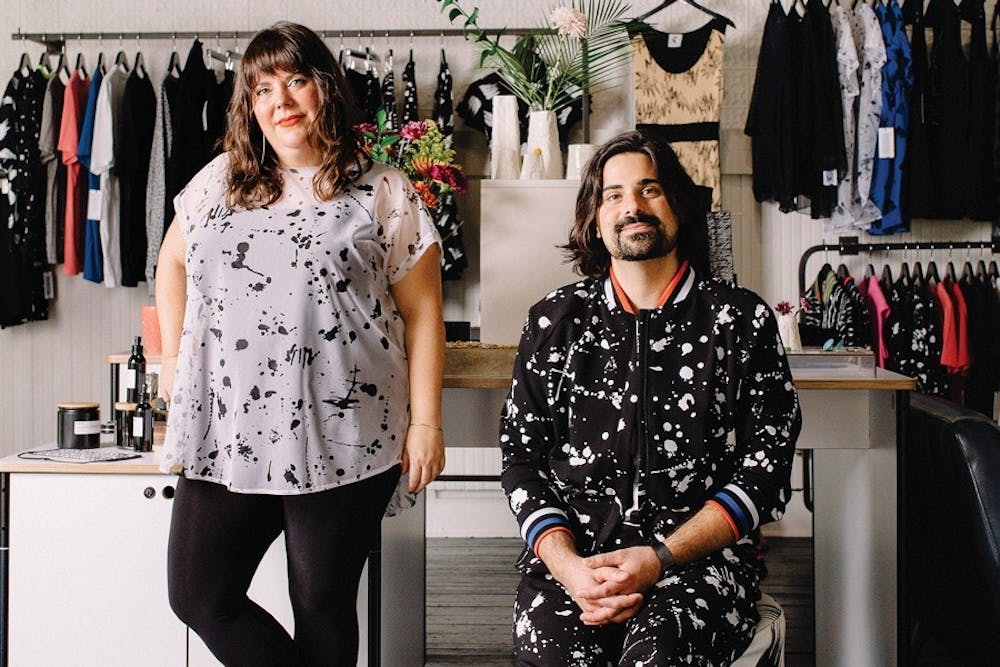Lobo Mau, a brother/sister–owned, Philadelphia–based fashion brand, pushes every year to reach levels of sustainability. They define their practices as slow fashion—an approach that emphasizes respect for the environment and the people that interact with each garment. Garments produced through slow fashion are often locally sourced, timeless pieces created to last.
The siblings, Nicole and Jordan Haddad, grew up just outside of West Philadelphia; their parents were Brazilian jazz musicians so they felt empowered to go into a field that they knew they might struggle in financially. Unlike their parents, they ran into the problem of lots of upfront costs needed to start a fashion brand.
The Haddads took a grassroots approach, working in a basement and slowly building an audience. It started as just Nicole’s brand—which she established in 2008—and in 2016, Jordan joined as the business side of the operation. Throughout their journey, they’ve focused on becoming a small and slow brand, and they remain hyperlocal to Philadelphia.
Coming out of Drexel’s Westphal College of Media Arts & Design, Nicole knew that she didn’t want to work for a big fashion corporation. She felt that she would have been “obscured by other people's sensibilities.” She feels that when you work for others, “you just kind of internalize their aesthetic and regurgitate it on your own.”
Nicole wanted her brand to be the opposite of big corporations like Zara and H&M. She took inspiration from the slow food movement that was blowing up in the late 2000s. The slow food movement emphasized farm–to–table food, and it led to Philadelphia growing “a burgeoning restaurant scene.” Nicole took these concepts and applied them to her brand, emphasizing the “dirt to shirt” concept of sustainability and locality in her designs. “It’s all local … I wanted to hire people that live here … I wanted to impact our local ecosystems,” she says.
Sustainability has always been a defining characteristic of Lobo Mau, and there are a number of initiatives that the business has undertaken to minimize its impact on the environment. Lobo Mau won Philadelphia Magazine’s Best 2019 Sustainable Local Brand Award, which has been a highlight in their efforts to provide ethically produced fashion. After receiving this honor, the brother/sister duo was able to open a flagship store in Queen Village in early 2020 through the help of a Kickstarter campaign. The store houses other local designers; all of which commit themselves to sustainability and slow fashion practices.
During the pandemic, the brand was able to become a City of Philadelphia Zero Waste Silver Partner by reorganizing its business model. This means that the brand manages to divert over 70% of its waste away from a landfill. Lobo Mau continues to focus on this initiative: they want to know “what we're putting out into the world versus what we're putting into landfills,” says Jordan. They see great potential in taking clothing to “break it down, or reuse it in some way or another,” Jordan says. They have already created pieces such as a vest that was knitted out of 400 yards of scrap fabric.
Lobo Mau keeps its small business image throughout its social media platforms. “We're not you know, one of those brands that you see bursting at the seams overnight with followers,” says Jordan. However, social media is about more than selling products to the team at Lobo Mau, and Nicole emphasizes that they see it as “one of [their] duties to educate our customer base about the perils of supporting fast fashion.” They want to “rewire people to not buy as much…and to buy better.”
Their small community of devoted followers gives the brand “a lot of flexibility to listen to the customers and listen to what people are saying,” says Jordan. They are able to amplify the voices of people ignored by fashion powerhouses. For example, Jordan explains that Lobo Mau is able to provide an extended sizing range that empowers people that normally “couldn't find clothing either that they liked or that they fit into.” Bigger companies have a lot more logistics to work through before expanding variations of a product; however, smaller fashion brands like Lobo Mau are nimble enough to fill in these untapped consumers because of their direct communication with the community.
When Nicole was first entering the industry, she recalls all fashion models being “really skinny and six feet [tall].” Now, she is glad to see the industry making strides to be inclusive of all ethnicities and body types when modeling clothes. She continues to push the envelope by utilizing people of all sizes, genders, and ethnicities as models for her clothing.
In the future, Nicole and Jordan want to expand the company to offer home decor as well as entrench themselves further into more sustainable, ethical, and hyperlocal business practices.
Correction: A previous version of this article stated that Lobo Mau was a fashion collective, which we have since determined is incorrect via further communication with the owners. We have updated the piece to refer to Lobo Mau as a company/brand instead. Street regrets this error.

